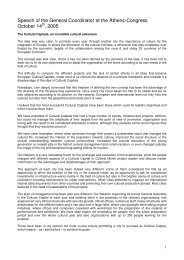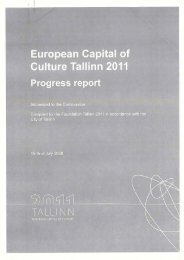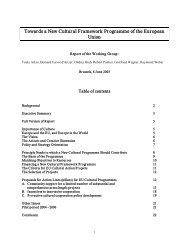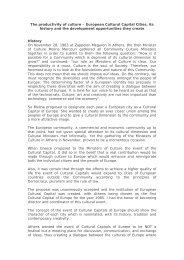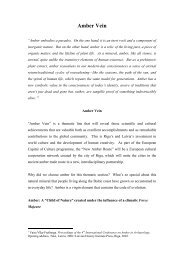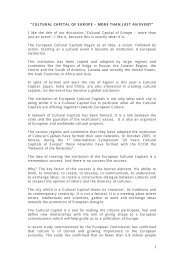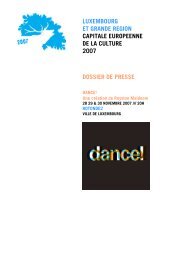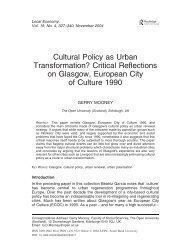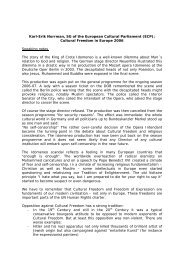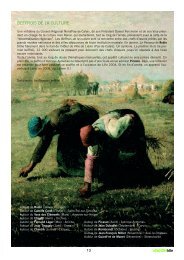patras 2006 - Documentation Centre on European Capitals of ...
patras 2006 - Documentation Centre on European Capitals of ...
patras 2006 - Documentation Centre on European Capitals of ...
Create successful ePaper yourself
Turn your PDF publications into a flip-book with our unique Google optimized e-Paper software.
να ξεχωρίζουµε τον ένα από τον άλλο; Ήµήπως δεν υπάρχει ο ένας και ο άλλος, παράένα, ενωµένο, µε την αλχηµεία της µυήσεως πουεπισυµβαίνει σε πλάσµατα χλωρά και µαλακά,επιρρεπή στις εµπειρίες των διηθήσεων και τωνεσωτερικών µετατοπίσεων… Η ύπαρξη πουκατεβαίνει στο χλοερό της τάφο, το όνειρο πουαναζητά τα σαρκικά του µνηµόσυνα... Να τηνη κούνια που ενώνει τον επάνω και τον κάτωκόσµο, το παιδικό παιχνίδι µε τον τρόµο, τοντρόµο µε την ηδονή, την ηδονή µε την οδύνη.Να µη ζει κανείς ή να µη ζει; Μόνο έτσιπαραλλαγµένο - ή µήπως διατυπωµένο ανοιχτά;- το ερώτηµα αποκαλύπτει την εµφάνιση, σε έναπρόσωπο, του αθεράπευτου ζωντανού και τουευοίωνου νεκρού στην ποίηση του Ρίτσου. Γιατίστην Περσεφόνη νοσταλγεί ο Γιάννης το θεριόκαι το θεριό το Γιάννη. Κι ο ποιητής, «σανάρρωστος απ’ τη µεγάλη διαφορά κλίµατος,φωτός, θερµότητας» κατεβαίνει στο νεκρό του,τον θερµαίνει, τον στολίζει και τον ανεβάζειεπάνω, στο ανελέητο φως της υπάρξεως.Εδώ θα συµβούν όλα τα ανεξήγητα. Γέννηση,δηλαδή, πτώση - άρα όλα ήδη στραµµένα προςτα κάτω - έρωτας, παιχνίδια των δαχτύλων µετις γεύσεις, των µατιών µε τους ήχους, βάρκες,νεαρές κολυµβήτριες κι ένας ωραίος νεαρόςκολυµβητής, ένα γκριζόµαυρο αντρικό παντελόνιπολύ εφαρµοστό, λουλούδια στα καλάθια,το µοσχοβόληµα: οι αµαρτίες του σπέρµατος.Εδώ βρισκόµαστε στη γη και δεν υπάρχειγιατρειά κι αυτό το ξέρει ο ποιητής.Όµως, ούτε εκεί υπάρχει γιατρειά, γι’ αυτόη Περσεφόνη ζει και θα ζει -εφόσοντην καταδίκασε η γραφή- το µαρτύριο τηςπεριφοράς, της αναχώρησης και της επανόδου,σε µια κυκλική αιωνιότητα από την αναγέννησηστο µαρασµό και πάλι και ξανά... Υποφέρειη Περσεφόνη και µαζί της υποφέρει κι ο Θεός.Η ατέρµονη επανάληψη δεν του επιτρέπεινα λυτρωθεί, εφόσον επιτρέπει στον άνθρωπονα καταστραφεί. Σαν τη ρόδα του carouselπου είναι καταδικασµένη να γυρίζει εσαεί απόπαλιά, ανεξήγητη βλάβη. Ίσως αυτό να είδεο ποιητής, πιστοποιώντας το ανεπανόρθωτο τηςγραφής. Ίσως αυτό να είδε η Περσεφόνη καιγι’ αυτό δεν το γνωρίζει, αφού κινείται ακόµη.Έτσι, µε αυτήν την διαισθαντική ανυποψία,την υποδεχόµαστε και µεις στο χώρο τουθεάτρου, γεγονός που προϋποθέτει την ύπαρξηκι άλλων νεκρών, παικτών και θεατών.Ελπίζουµε για συνένοχους στη θέα της κούνιαςπου ενώνει το παιχνίδι µε τον τρόµο, τον τρόµοµε την ηδονή, την ηδονή µε το προσδοκώµενοχειροκρότηµα του τέλους.Γ. ΣΥΝΑΥΛΙΑ Γιάννης Ρίτσος – Μίκης Θεοδωράκης:Επιτάφιος, Ρωµιοσύνη, Λιανοτράγουδα1η Μαΐου <str<strong>on</strong>g>2006</str<strong>on</strong>g> Πλατεία ΕλευθερίαςΤο «Αφιέρωµα στο Γιάννη Ρίτσο» µε συγκινεί ιδιαίτερα, όχι µονάχα γιατί ο Ρίτσος είναι ένας αγαπηµένος ποιητής, αλλά και γιατί ήτανένας στοχαστής που θαύµαζα και ένας πολίτης που µοιράστηκα µαζί του ιδέες, φιλία, αγώνες και δοκιµασίες. Οι τρεις κύκλοι τραγουδιώνπου θα ερµηνευθούν, «Επιτάφιος», «Ρωµιοσύνη» και «Λιανοτράγουδα», υπήρξαν και είναι θεµέλια της µουσικής µου, ενώ παράλληλασυνδέθηκαν µε κορυφαίες στιγµές της πρόσφατης ιστορίας µας, και ίσως γι’ αυτόν το λόγο τους αγκάλιασε και τους αγάπησε τόσο βαθιάο λαός µας. Στην ουσιαστική υποταγή κατά το δηµώδες «Βασίλη κάτσε φρόνιµα να γίνεις σπιτονοικοκύρης», που κατάντησενα γίνει κυρίαρχη στάση των «λογικών» και των «υπεύθυνων» κύκλων της χώρας, η «Ρωµιοσύνη» έρχεται να υπενθυµίσει την «αρχή»,ότι οι λαοί που θέλουν να ζήσουν ελεύθεροι τοποθετούν την «τιµή» πάνω από ο,τιδήποτε άλλο.Τουλάχιστον αυτό έκαναν οι ελεύθεροι Έλληνες από το ’21 έως την αντίσταση κατά της Χούντας.Μίκης Θεοδωράκης (16 Απριλίου 2003)«Ο Γιάννης Ρίτσος απόδειξε µε το έργο του και τη ζωή του ότι όχι µόνο η ποίηση δεν αντιστρατεύεται τη στράτευση, αλλά ότι,όσο περισσότερο και ουσιαστικότερα είναι κανείς στρατευµένος στη µεγάλη ιδέα της Επανάστασης, τόσο ουσιαστικότερακαι αποτελεσµατικότερα υπηρετεί την ιδέα της Τέχνης. Έδειξε ακόµα ότι η ελληνικότητα συµβαδίζει ή µάλλον σηµαίνει παγκοσµιότητα.Γιατί είναι ο ποιητής της «Ρωµιοσύνης», αυτός που άκουσε καλύτερα από κάθε άλλον τους µυστικούς χτύπους της καρδιάς του λαού καιτα κρυφά µηνύµατα της µοίρας του, άλλοτε δοξαστικά, άλλοτε προφητικά, πολύ συχνά θρηνητικά κι ακόµα πιο συχνά γεµάτος πίστηκαι απόφαση. Είναι, λοιπόν, αυτός που ταυτίστηκε τελεσίδικα µε τα δέντρα, τις πέτρες και τις καρδιές που δε βολεύονται, ο κατ’ εξοχήνΈλληνας, που βρήκε την πιο πλατιά απήχηση σε όλα τα πλάτη και τα µήκη του πλανήτη µας, δείχνοντας πως το εθνικό και το παγκόσµιοταυτίζονται, όπως ταυτίζονται και τα όνειρα και οι ελπίδες όλων των ανθρώπων, όπου γης, για πανανθρώπινη λευτεριά. Εµείς που ζήσαµεστην εποχή του, που γευόµαστε το στίχο του, όπως ο πιστός το αντίδωρο της θείας µετάληψης, είµαστε ευγνώµονες γι’ αυτό».Μίκης Θεοδωράκης («Αφιέρωµα στο Γιάννη Ρίτσο», Αθήνα 1980, Κέδρος)32the emergence <strong>of</strong> the incurable living and thehopeful dead both in <strong>on</strong>e character, in Ritsos’poetry.Why, in Perseph<strong>on</strong>e, does Yiannis yearn forthe beast and the beast for Yiannis? And the poet,“like an ill-being from the great difference inclimate, light and heat” descents to his dead,warms him, embellishes him and elevates himto the remorseless light <strong>of</strong> being. Here will all theinexplicable happen. Birth, namely drop – thereforeall is already directed downwards – love, games<strong>of</strong> the fingers with the tastes, <strong>of</strong> the eyes withthe sounds, boats, young female swimmers anda handsome young male swimmer, dark-grey,very tight man’s pants, flowers in baskets, thesweet smell: the sins <strong>of</strong> sperm. Here, we are <strong>on</strong>earth and there is no cure.This the poet knows.But, there is no cure there either. For this reas<strong>on</strong>Perseph<strong>on</strong>e lives and will live –since she isc<strong>on</strong>demned by the script– the torment <strong>of</strong>processi<strong>on</strong>, <strong>of</strong> departure and <strong>of</strong> comeback, in anorbicular eternity from rebirth to withering andagain and again… Perseph<strong>on</strong>e suffers and Godsuffers with her. The endless recurrence does notallow him to redeem, since he allows man toperish. Like a merry-go-round, c<strong>on</strong>demnedto evermore go round and round due to an old,unsolved malfuncti<strong>on</strong>. Perhaps this is whatthe poet saw, attesting all bey<strong>on</strong>d redempti<strong>on</strong> <strong>of</strong>the script. Perhaps this is what Perseph<strong>on</strong>e sawand does not yet know since she is still in moti<strong>on</strong>.So, with this intuitive unsuspectedness, we alsowelcome her in the theatre, presupposing theexistence <strong>of</strong> the other dead, actors and audience.We hope for accomplices in view <strong>of</strong> the cribwhich unites the toy with the horror, the horrorwith the pleasure, the pleasure with the anticipatedapplause <strong>of</strong> the end.Σωτήρης ΧατζάκηςSotiris ChatzakisC. CONCERT Yiannis Ritsos – Mikis Theodorakis:Epitaph, Romiossini, Lianotragouda1st May, <str<strong>on</strong>g>2006</str<strong>on</strong>g> Eleftherias Square“Tribute to Yiannis Ritsos” moves me in a special way, not <strong>on</strong>ly because Ritsos is a beloved poet but also because he was a thinkerthat I admired and a citizen with whom I shared c<strong>on</strong>cepts, friendship, struggles and trials. The three series <strong>of</strong> s<strong>on</strong>gs that will beinterpreted, “Epitaph”, “Romiossini” (The Greek Nati<strong>on</strong> and the Greek Spirit during the centuries) and “Lianotragouda” (The eighteenlittle s<strong>on</strong>gs for the bitter homeland), were and still are the foundati<strong>on</strong>s <strong>of</strong> my music, while at the same time they are tied to importantmoments <strong>of</strong> our recent history and perhaps for this reas<strong>on</strong> our Nati<strong>on</strong> embraced and loved them so deeply.In c<strong>on</strong>trast to the ideal absolute submissi<strong>on</strong> advocated by the folk (demotiko) s<strong>on</strong>g "Vassilis, katse fr<strong>on</strong>ima na gineis nikokiris”(Vassilis, behave yourself so you can become a family man) which emerged as the dominant attitude <strong>of</strong> the “reas<strong>on</strong>able”and “resp<strong>on</strong>sible” circles <strong>of</strong> Greece, “Romiossini” comes as a reminder for the “principle” that Nati<strong>on</strong>s desiring to live in freedom place“h<strong>on</strong>our” above everything else. At least that is what the liberated Greeks did from 1821 until the resistance against the Junta.Mikis Theodorakis (April 26, 2003)“With his work and his life Yiannis Ritsos proved that not <strong>on</strong>ly poetry does not oppose commitment but also that the more trulysome<strong>on</strong>e is committed to the great idea <strong>of</strong> the Revoluti<strong>on</strong>, all the more truly and effectively he will serve the c<strong>on</strong>cept <strong>of</strong> Art. Moreover,he showed that hellenism is in step with, or rather means universality. Because he is the poet <strong>of</strong> “Romiossini” (The Greek Nati<strong>on</strong> and theGreek Spirit during the centuries), he perceived better than any<strong>on</strong>e the musical heart beats <strong>of</strong> the Nati<strong>on</strong> and the hidden messages <strong>of</strong>its fate, other times gloriously, other times prophetically, very <strong>of</strong>ten plaintively and even more <strong>of</strong>ten full <strong>of</strong> faith and determinati<strong>on</strong>.He is the <strong>on</strong>e who irrevocably identified himself with the trees, the st<strong>on</strong>es and the restless hearts, the ultimate Greekwho achieved recogniti<strong>on</strong> from every corner <strong>of</strong> the planet, by proving that the Nati<strong>on</strong> and the Universe are <strong>on</strong>e,in the same way that the dreams and hopes <strong>of</strong> the people all around the world are <strong>on</strong>e with liberty for all mankind.We who lived in his time, we who taste his poetic verse as a believer tastes the holy bread <strong>of</strong> communi<strong>on</strong>, are grateful for this”.Mikis Theodorakis (“Tribute to Yiannis Ritsos”, Athens 1980, Kedros Publicati<strong>on</strong>s)33



